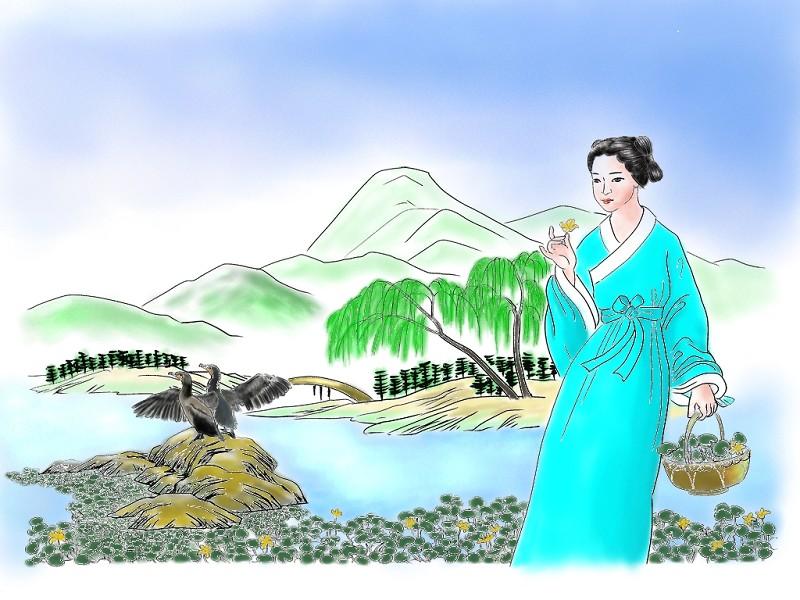In ancient China, widows who decided not to remarry were considered models of loyalty and chastity. At the same time, when it came to major life-changing events, the Chinese believed that it was heaven, not mortals, who had the final say over one’s destiny. This principle is embodied in the folktale behind the proverb “Just as rain falls from the heavens, your mother must marry.”
A long time ago, there was a scholar called Zhu Yaozong, whose father fell ill and died when he was only a year old. His mother, wishing to avoid introducing a stepparent into her young son’s life, raised him alone. When he was older, Yaozong went to study with a teacher called Zhang Wenju.
By Teacher Zhang’s strict instruction, Yaozong proved an able student. At 15 he passed the county level imperial exam; at 18, he achieved the highest rank and was granted an audience before the emperor. The emperor was so impressed with the young man’s accomplishments that he arranged for him to marry a princess.
At this point, Yaozong thought of his mother, who had remained single for his sake, and told the emperor of her sacrifices. Moved, the emperor immediately ordered that an arch honoring the chaste widow be erected in Yaozong’s hometown.
But when the new imperial scholar went home and told his mother of the good news, her joy turned to worry. In the time that her son was away in the capital, she had grown close to Teacher Zhang and the two had been engaged. They were planning the wedding in anticipation of Yaozong’s return.
Shocked, Zhu prostrated himself before his mother and wept, saying “Mother, if this is true, then it means I will have committed deceit of the emperor. This is a crime that warrants the extermination of our entire family!”
His mother began to weep as well. She was already engaged to Teacher Zhang, but at the same time she knew the gravity of deceiving the emperor. Finally she said, “Let our fate be decided by heaven.”
Speaking, she took off one of her silk skirts and gave it to Zhu. “My son, as a filial child, please do me a favor and wash this silk skirt for me tomorrow. If it dries by nightfall, then I'll cancel the engagement. If it’s still wet, then leave us be.” Zhu accepted.
The next day was clear and bright. As he washed, Zhu Yaozong thought to himself happily that drying not just one but even 10 skirts would be no problem in such good weather. But no sooner had he washed the garment and hung it up to dry in the courtyard, storm clouds gathered ominously and in no time a downpour had started. By midnight, the skirt was wetter than it had been when Yaozong had just finished washing it.
At this, Yaozong’s mother said, “My son, just as rain falls from the heavens, your mother must marry. You can’t oppose the will of heaven.”
Though Yaozong grieved and lamented his misfortune, the circumstances gave him little choice. Upon returning to the imperial capital and once again in the emperor’s presence, Yaozong spoke frankly about his mother’s marriage to Zhang Wenju, as well as the result of their bet. He then readied himself for his punishment.
Hearing Yaozong’s story, the emperor considered the matter and said, “This match has been arranged by heaven. Let us not interfere.”
Henceforth, the Chinese use of “Just as rain falls from the heavens, your mother must marry” (tian yao xia yu, niang yao jia ren) has become a proverb used to indicate that which has been predestined and cannot be undone.




